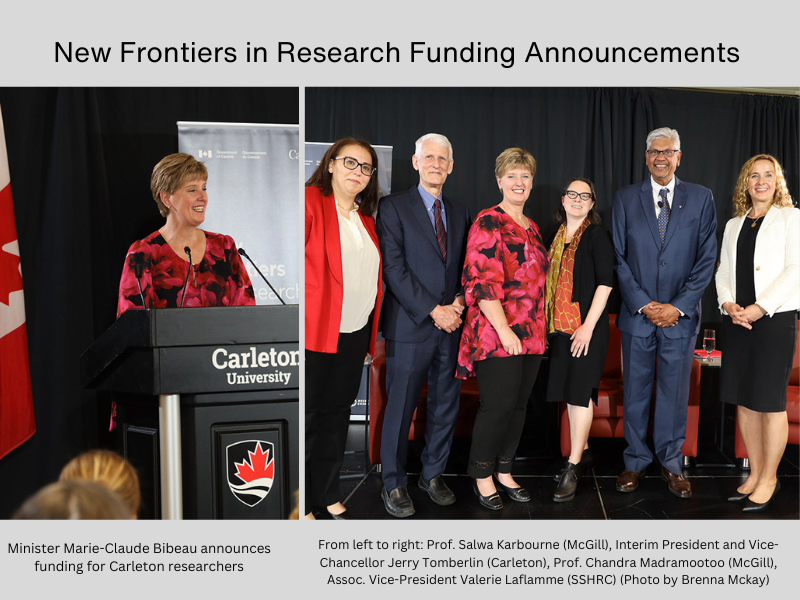Elisabeth Gilmore: Equitable Climate Adaptation Pathways for the Precariously Housed

Environmental Engineering and Public Policy researcher Elisabeth Gilmore’s project Equitable Climate Adaptation Pathways for the Precariously Housed has has been awarded $1.5 million from the International Joint Initiative for Research in Climate Change Adaptation and Mitigation, a stream of the federal government’s New Frontiers in Research Fund (NFRF). The NFRF funding announcements were made on June 3 – see News Release from the Canada Research Coordinating Committee, and livestream recording of Minister Marie-Claude Bibeau’s NFRF funding annoucements at Carleton University


Project: Equitable Climate Adaptation Pathways for the Precariously Housed
Nominated Principal Investigator: Gilmore, Elisabeth
Nominated Principal Investigator Affiliation: Carleton University
Application Title: Transforming places for the precariously housed: Equitable adaptation pathways for climate mobilities
Amount Awarded: $1,499,362
Co-Principal Investigator: Adams, Helen; Brooks, Shirley; Maharjan, Amina; Sutherland, Catherine
Co-Applicant: Audia, Camilla; Caughey, Amy; Gurung, Barsha Rani; Harper, Sherilee; O’Brien, William; Paterson, Shona; Thapa, Rajesh Bahadur
International co-funding Partners: National Research Foundation, UK Research and Innovation
This initiative addresses the underlying development patterns and inequities that make people, and disproportionally make marginalised people, more vulnerable to the impacts and risks of climate change. Gilmore and her research team in Canada, U.K., South Africa and Nepal are working with communities and local governments, including in partnership with the Inuit Niqivut Silalu Asijjipalliajuq project team.
More people will be on the move as extreme weather due to climate change threatens lives, destroys property and ruins livelihoods. However, others may choose to stay and adapt to the changing climate. Gilmore’s project focuses on what a desirable future home and neighbourhood would look like from the perspective of those who are making decisions on how to use human mobility/migration in the face of climate risks and for the communities that host them. This project will explore how to weave the information from the precariously housed into processes, metrics and indicators that governments use for planning and infrastructure development – providing novel entry points for policymakers to carry out transformational projects that address underlying poverty and inequality.
-Excerpt from Carleton Newsroom post Ground-Breaking Carleton Projects Receive New Frontiers in Research Funding
Research Summary
Climate change will mean more people on the move as extreme weather threatens lives, destroys property and ruins livelihoods. Most people will move from the countryside to the city. However, some will change their local mobility patterns, or take up seasonal migration to find work elsewhere. Others may choose to stay and adapt to the changing conditions. Climate mobilities is a term used to describe these diverse migration responses to climate impacts.
This project works to support city and municipal councils in preparing for diverse climate mobilities. City mayors are considering how to invest in infrastructure and city planning for climate-related migration. However, unless the actions they take are driven by the priorities of the most affected, they may end up making things worse for people. Therefore, this project focuses on what a desirable future home and neighbourhood would look like from the perspective of those on the move and the communities that host them. Traditionally, such information has been difficult for planners and policymakers to include in their existing decision making structures. Therefore a key part of the project is to understand how to weave the information we gain from the precariously housed into the metrics and indicators that governments would be more familiar with. In this way, the project provides entry points for policymakers to carry out more transformational projects that address underlying poverty and inequality.
The research takes place in four locations, investigating different climate mobilities:
- Highly climate change-exposed Inuit communities who do not want to leave;
- Rural climate-related migrants moving to the Kathmandu in Nepal;
- People displaced by flooding in Durban, South Africa; and
- International migrants in London, UK who fall through the cracks in the city’s adaptation actions. The project uses community-led and arts-based research methods that value and elevate the knowledge of people on the ground. The project also engages local municipalities and regional and national governments to ensure that such knowledge is incorporated into future adaptation planning.”